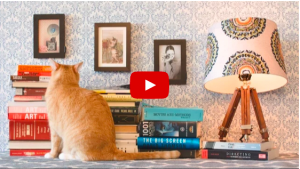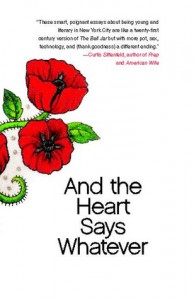After a long absence, I made a YouTube (aka BookTube) video.
I’ll be back on my channel to talk about books – promise! – and you can subscribe here.
Enjoy!
by Nicola //
After a long absence, I made a YouTube (aka BookTube) video.
I’ll be back on my channel to talk about books – promise! – and you can subscribe here.
Enjoy!
by Nicola //

I’m currently in California, it’s the 4th of July, and I’ve been trying to break through a blogging block.
So here are some things I’ve been thinking about, lately…

Sometimes you need to be around something physically to get it. I’ve been on Snapchat for ages, and until recently it was all silly selfies from close friends, but we’d all tired of it.
Now that there are Stories there’s much more to see. Now that I’m in California, my in-laws using it has prompted me to give it a go. Follow me @robotnicola or do the snappy thing with the image above.
![]()
I totally thought this site had shut down like 5 years ago??? But apparently it didn’t. I used it for awhile, I’d wager around 2008/9 – though I can’t be certain. It’s a place for freewriting 750 words on a daily basis in a way that is, as the prompt says, Private, unfiltered, spontaneous, daily. This also brings me to…

James spoke about writing at Small is Beautiful. It’s easy to romanticise writing – as the Emily St John Mandel piece (which I linked in Reading Week #61) attests. To write is to work. But sometimes you need a reminder and some cutesy quotes to fall back in love and back into good habits.
The idea I liked best from his talk was his opening hook about how writing is a great time-traveling device. It allows us access into the minds and thoughts of people in past times and places; and that’s what makes it special. I’m really enjoying personal writing lately, and thinking back on my own, so it’s a nice way to contextualise it all.

This guy, author of Steal Like An Artist, also came up a couple of times in Reading Week #61, and on the Writer Files podcast recently. He does a similar wrap-up/annotated reading style of blog posts to Brain Pickings – one I’ve long wanted to crib but have felt too daunted to do so. I’d like to get on with that.

Emily Diana Ruth, whose weekly “this week, in my brain” blogs inspired this style, featured a filmmaker-YouTuber called Yulin Kuang. Emily had linked a video of Yulin’s from the point of view of a filmmaker cat in LA, and all the angst that comes along with that lifestyle. It’s adorable.
I then went to another video called Thinking Out Loud – a weekly feature and this one was about her second kiss (or kissee), in which she reconnected with the guy and read her diaries aloud to him to compare notes on their memories of the time. The time-machine idea came up here again: she said reading her diaries from when she was 17 was like one, though you can never really get back to that person.
This and much else I’ve cited have made me wish I’d been more of a consistent diarist over the years. I’m a start-stop diarist, and tend to write angry, so there’s not much worth savouring in my past diaries. Yet again, now, I’m starting over, trying to build the habit and avoid falling back into old tendencies like writing through rage and never in lighter moments.
What have you been into lately?
by Nicola //

I never can decide how much – or if – I like Emily Gould.
I became aware of her work later than most; not during her days at Gawker but after reading her essay for the Chad Harbach-edited collection MFA vs NYC. There, she writes about the experience of writing her first novel (and simultaneously squandering a six-figure advance).
This essay collection came before the novel (Friendship, released earlier this year) and largely covers the period of Emily’s college years up until her mid-twenties stint at Gawker.
Like the character of Emily Gould – i.e. the figure as portrayed through endless literary darling style New York magazine profiles – I couldn’t get a grasp on who this girl is or what she’s really about. There’s some charm and seeming wisdom about the nature of workmates, some angst over undercooked relationships, twinges of a tension between money troubles and wanting to have nice things… and, appealingly, a bald admittance of feeling exceptional.
While a few of the pieces in this collection feel decidedly aimless, they do hang together loosely around its main conceit – the title. And The Heart Says Whatever. But can it keep doing so forever?
Its ties to the novel Friendship are quickly clear as she introduces the Gawker office’s laptop brigade and an artsy boyfriend she’s coolly ambivalent about. Much is made of her job being to pinpoint stuff she hates comes up twice but doesn’t really come to anything. There’s something about these essays in which there’s never a fine enough point put on its conclusion.
The Introduction is a perfect example. It makes a lot of sense in relation to the book’s title, but otherwise it makes not much sense at all. Like many of the other essays here, it reads like a blog post with a learned essay morality tale tacked on to try to make it something more. Something a little more timeless, maybe?
It’s in the piece The Koi Pond that Gould speaks of feeling “somehow extraordinary”.
“Free-floating ambition is toxic because it means that anyone who has accomplished anything in any realm of human endeavor is the enemy because she might be your competition. So you hate everyone a little bit, but behind this wall of hatred you still feel vulnerable. And you are vulnerable, but not because of the competition. You’re vulnerable because if anyone points you in anything that seems like a direction, that’s where you’ll go.”
That targeted, nameless need becomes the most genuine sounding thing she writes in 100 pages or so, amidst conflicting personal histories about which university she went to and why.
But, at her best when she just tells stories – day to day stuff – without trying to make it metaphorical. Dunno, they’re just published blog posts with better descriptive prose, really.
Maybe the next one will be better.
Click through to read more articles from The Essayist Project series.
To support The Essayist Project, please consider purchasing And the Heart Says Whatever using these links:
Amazon | Book Depository